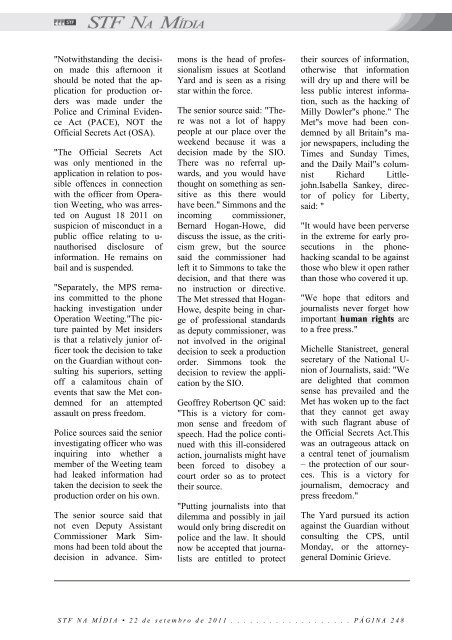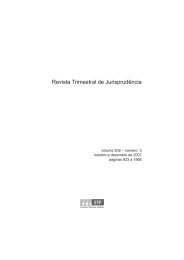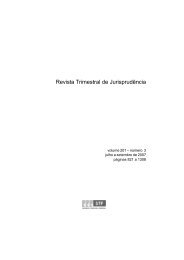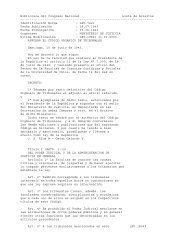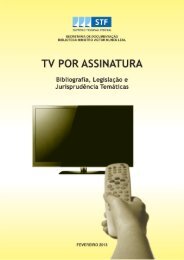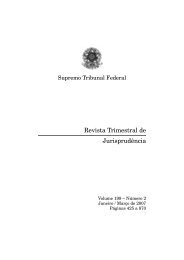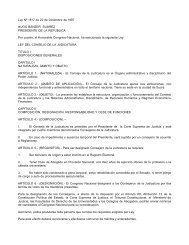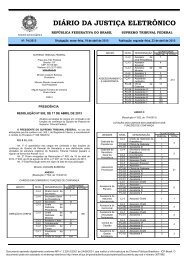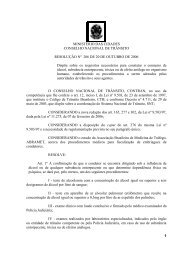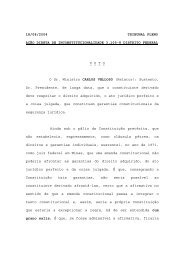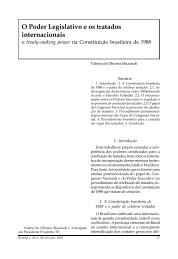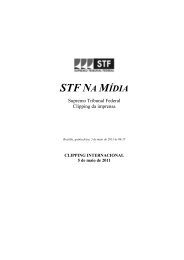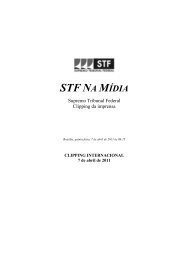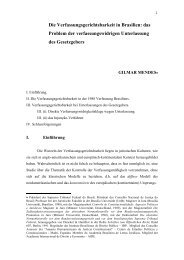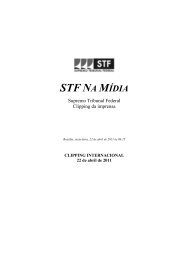STF NA MÍDIA
STF NA MÍDIA
STF NA MÍDIA
Create successful ePaper yourself
Turn your PDF publications into a flip-book with our unique Google optimized e-Paper software.
"Notwithstanding the decision<br />
made this afternoon it<br />
should be noted that the application<br />
for production orders<br />
was made under the<br />
Police and Criminal Evidence<br />
Act (PACE), NOT the<br />
Official Secrets Act (OSA).<br />
"The Official Secrets Act<br />
was only mentioned in the<br />
application in relation to possible<br />
offences in connection<br />
with the officer from Operation<br />
Weeting, who was arrested<br />
on August 18 2011 on<br />
suspicion of misconduct in a<br />
public office relating to u-<br />
nauthorised disclosure of<br />
information. He remains on<br />
bail and is suspended.<br />
"Separately, the MPS remains<br />
committed to the phone<br />
hacking investigation under<br />
Operation Weeting."The picture<br />
painted by Met insiders<br />
is that a relatively junior officer<br />
took the decision to take<br />
on the Guardian without consulting<br />
his superiors, setting<br />
off a calamitous chain of<br />
events that saw the Met condemned<br />
for an attempted<br />
assault on press freedom.<br />
Police sources said the senior<br />
investigating officer who was<br />
inquiring into whether a<br />
member of the Weeting team<br />
had leaked information had<br />
taken the decision to seek the<br />
production order on his own.<br />
The senior source said that<br />
not even Deputy Assistant<br />
Commissioner Mark Simmons<br />
had been told about the<br />
decision in advance. Simmons<br />
is the head of professionalism<br />
issues at Scotland<br />
Yard and is seen as a rising<br />
star within the force.<br />
The senior source said: "There<br />
was not a lot of happy<br />
people at our place over the<br />
weekend because it was a<br />
decision made by the SIO.<br />
There was no referral upwards,<br />
and you would have<br />
thought on something as sensitive<br />
as this there would<br />
have been." Simmons and the<br />
incoming commissioner,<br />
Bernard Hogan-Howe, did<br />
discuss the issue, as the criticism<br />
grew, but the source<br />
said the commissioner had<br />
left it to Simmons to take the<br />
decision, and that there was<br />
no instruction or directive.<br />
The Met stressed that Hogan-<br />
Howe, despite being in charge<br />
of professional standards<br />
as deputy commissioner, was<br />
not involved in the original<br />
decision to seek a production<br />
order. Simmons took the<br />
decision to review the application<br />
by the SIO.<br />
Geoffrey Robertson QC said:<br />
"This is a victory for common<br />
sense and freedom of<br />
speech. Had the police continued<br />
with this ill-considered<br />
action, journalists might have<br />
been forced to disobey a<br />
court order so as to protect<br />
their source.<br />
"Putting journalists into that<br />
dilemma and possibly in jail<br />
would only bring discredit on<br />
police and the law. It should<br />
now be accepted that journalists<br />
are entitled to protect<br />
their sources of information,<br />
otherwise that information<br />
will dry up and there will be<br />
less public interest information,<br />
such as the hacking of<br />
Milly Dowler"s phone." The<br />
Met"s move had been condemned<br />
by all Britain"s major<br />
newspapers, including the<br />
Times and Sunday Times,<br />
and the Daily Mail"s columnist<br />
Richard Littlejohn.Isabella<br />
Sankey, director<br />
of policy for Liberty,<br />
said: "<br />
"It would have been perverse<br />
in the extreme for early prosecutions<br />
in the phonehacking<br />
scandal to be against<br />
those who blew it open rather<br />
than those who covered it up.<br />
"We hope that editors and<br />
journalists never forget how<br />
important human rights are<br />
to a free press."<br />
Michelle Stanistreet, general<br />
secretary of the National U-<br />
nion of Journalists, said: "We<br />
are delighted that common<br />
sense has prevailed and the<br />
Met has woken up to the fact<br />
that they cannot get away<br />
with such flagrant abuse of<br />
the Official Secrets Act.This<br />
was an outrageous attack on<br />
a central tenet of journalism<br />
– the protection of our sources.<br />
This is a victory for<br />
journalism, democracy and<br />
press freedom."<br />
The Yard pursued its action<br />
against the Guardian without<br />
consulting the CPS, until<br />
Monday, or the attorneygeneral<br />
Dominic Grieve.<br />
S T F N A M Í D I A • 2 2 d e s e t e m b r o d e 2 0 1 1 . . . . . . . . . . . . . . . . . . . P Á G I N A 2 4 8


